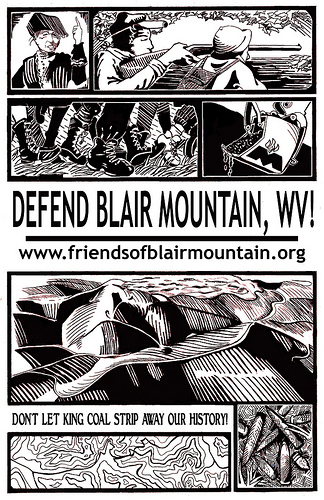March on Blair Mountain: A History of Resistance
Primary tabs
The March on Blair Mountain seeks to preserve the historical Blair Mountain, put an end to the disastrous practice of mountain top removal, and, like the Battle of Blair, to strengthen labor and community rights. All are welcome to come and join together in this fight for human rights and environmental justice.

Here's something the history books left out: In 1921, more than 10,000 West Virginia coal miners rose up in resistance to coal companies who refused to allow miners to unionize. It was the largest armed insurrection in the United States since the Civil War. This uprising, which took place in Logan County, West Virginia, is known as the Battle of Blair Mountain. The miners were met with a private army of police funded by coal companies, who employed, among other things, World War One planes to drop bombs and gas.
The Battle of Blair Mountain was five days long and bloody, leaving dozens of miners dead and many more imprisoned. Despite an impressive resistance effort, in the end the battle was lost upon the intervention of the United States army, who supported the coal industry. Blair was just one of many struggles to resist the oppression and hegemony of coal companies throughout the long history of mining in Appalachia, but it was unsurpassed in size and significance.
Big coal did all it could to prevent miners from unionizing and to silence their demands for fair wages and decent working conditions. In the late 1800s, the coal industry set up company towns throughout Appalachia, a fundamentally feudal system where companies owned all town establishments and paid workers in company scrip. Tactics included intimidation, harassment, physical violence—even murder. Coal companies hired gun thugs and strikebreakers to threaten miners, ensuring that they wouldn't organize.
Today, coal companies like Massey Energy, now Alpha Energy, continue to exploit workers and ravage the environment through newer mining practices including mountain top removal. This devastating form of “extreme strip mining†entails literally blowing up mountains in order to extract the seams of coal within. Mountains are stripped of trees and topsoil, and finally detonated. Not only does this process destroy the mountain itself, the “overburdenâ€â€”toxic chemicals used as part of the extraction process— flow into nearby water sources, contaminating water in entire region. The result is deadly both to wildlife and to human inhabitants anywhere near a Mountain Top Removal site.
Studies and statistics have verified this, yet the coal companies continue, as they always have, to neglect the rights of miners and miners' families, putting profit ahead of human lives. Indeed, big coal has proven to be, again and again, hostile to Appalachian communities, culture, and land. And as of right now, over five hundred mountains have been destroyed by this egregious process.
Appalachia is the second most bio-diverse region on the planet. Blair Mountain is covered in lush, thick forests. West Virginia's resplendent mountain crests and tree-laden ridges are breathtaking, and Blair Mountain is no exception. But Blair Mountain is exceptional in its history—the history of more than ten thousand miners coming together to combat the brutish ways of the coal companies This is the history of a bonafide peoples' resistance, defending their land and very lives from corporate exploitation. But the stories of the Battle of Blair are slowly fading into the past. The destruction of Blair Mountain is a death sentence for this rich history. When Blair Mountain is blown up, a chapter in American labor history is torn out and forever lost. The coal companies will have robbed the people of Appalachia of still one more thing: their history.
On June 4, hundreds of people from Appalachia and all over the country will come together to demand the rights of people and ecology. We implore that Blair Mountain be saved from the coal companies who wish to destroy it, as they have done to so many mountains—and people—in the name of profit.
We will march for five days, starting in Marmet, WV, and arriving at last at Blair Mountain, where we will proclaim this mountain's right to exist. Standing united against the exploitation and profiteering of big business will be miners and local citizens, activists, students, academics, and environmentalists.
Losing Blair to mountain top removal will allow the coal companies to once more devour and nullify the history of Appalachian peoples' resistance, in an effort to eradicate it altogether. The March on Blair Mountain is a call for justice, when there has been so little of it over the past century and a half in Appalachia.
The March seeks to preserve the historical Blair Mountain, put an end to the disastrous practice of mountain top removal, and, like the Battle of Blair, to strengthen labor and community rights. All are welcome to come and join together in this fight for human rights and environmental justice.









